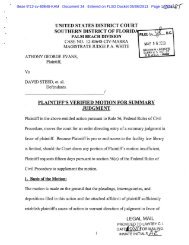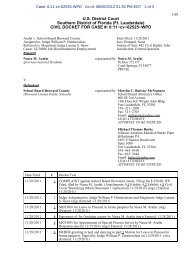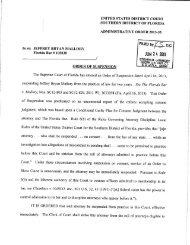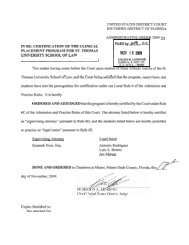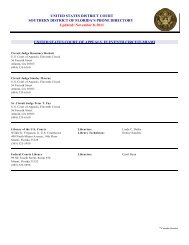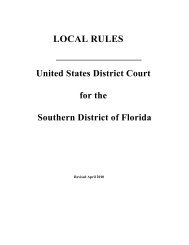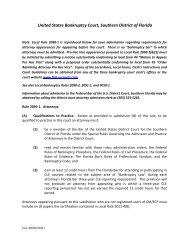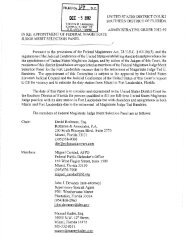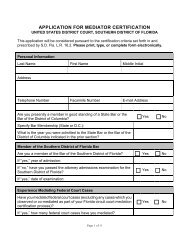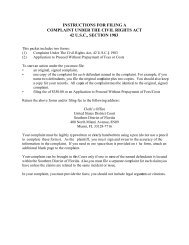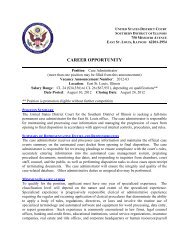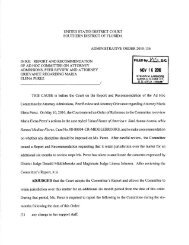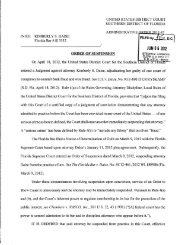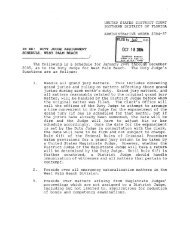JAN j 6 2010 - United States District Court
JAN j 6 2010 - United States District Court
JAN j 6 2010 - United States District Court
You also want an ePaper? Increase the reach of your titles
YUMPU automatically turns print PDFs into web optimized ePapers that Google loves.
eference of any matter to a Magistrate Judge. This rule, however, shall not<br />
preclude a <strong>District</strong> Judge or Magistrate Judge from informing the parties that<br />
they may have the option of referring a case to a Magistrate Judge.<br />
(3) References. After the consent form has been executed and filed, the Clerk<br />
of the <strong>Court</strong> shall transmit it to the <strong>District</strong> Judge to whom the case has been<br />
assigned for consideration of approval and possible referral of the case to a<br />
Magistrate Judge, by specific order of reference. Once the case has been<br />
assigned to a Magistrate Judge, the Magistrate Judge shall have the authority<br />
to conduct any and all proceedings to which the parties have consented and to<br />
direct the Clerk of the <strong>Court</strong> to enter a final judgment in the same manner as<br />
if a <strong>District</strong> Judge had presided.<br />
Effective Dec. 1, 1994. Amended April 15, 2007.<br />
Rule 4. Review and Appeal<br />
(a) Appeal of Non-dispositive Matters-Government Appeal of Release Order.<br />
(1) Appeal of Non-dispositive Matters-Title 28, <strong>United</strong> <strong>States</strong> Code, Section<br />
636(b)(1)(A). Any party may appeal from a Magistrate Judge's order determining<br />
a motion or matter under subsection l(c) of these rules, supra, within tee<br />
fourteen (14) days after being served with the Magistrate Judge's order, unless<br />
a different time is prescribed by the Magistrate Judge or <strong>District</strong> Judge. Such<br />
party shall file with the Clerk of the <strong>Court</strong>, and serve on all parties, written<br />
objections which shall specifically set forth the order, or part thereof,<br />
appealed from a concise statement of the alleged error in the Magistrate<br />
Judge's ruling, and statutory, rule, or case authority, in support of the<br />
moving party's position. Any party may respond to another party's objections<br />
within feea-fourteen (14) days after being served with a copy thereof, or within<br />
such other time as may be allowed by the Magistrate Judge or <strong>District</strong> Judge.<br />
Absent prior permission from the <strong>Court</strong>, no party shall file any objections or<br />
responses to another party's objections exceeding twenty pages in length. The<br />
<strong>District</strong> Judge shall consider the appeal and shall set aside any portion of the<br />
Magistrate Judge's order found to be clearly erroneous or contrary to law. The<br />
<strong>District</strong> Judge may also reconsider sua sponte any matter determined by a<br />
Magistrate Judge under this rule.<br />
(2) Government Appeal of Release Order. At the conclusion of a hearing<br />
pursuant to Title 18, <strong>United</strong> <strong>States</strong> Code, Section 3142 in which a Magistrate<br />
Judge has entered an order granting pretrial release, the government may make<br />
an ore tenus motion that the Magistrate Judge exercise discretion to stay the<br />
release order for a reasonable time, to allow the government to pursue review<br />
or appeal of the release order, in accordance with Title 18, <strong>United</strong> <strong>States</strong><br />
Code, Section 3145.<br />
If a stay is ordered pursuant to this rule, the Clerk of the <strong>Court</strong> is directed<br />
to obtain the tape recording or cassette immediately after the hearing and<br />
deliver the cassettes or tapes promptly to the appropriate court reporter so<br />
that an expedited transcript can be delivered to the <strong>District</strong> Judge within<br />
forty-eight hours of the hearing at which the release order is entered. The<br />
<strong>United</strong> <strong>States</strong> Attorney's Office is to pay the court reporter's charges.<br />
(b) Review of Case-Dispositive Motions and Prisoner Litigation-Title 28, <strong>United</strong><br />
156



